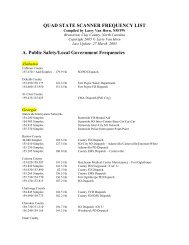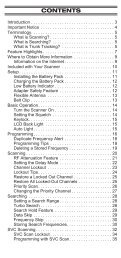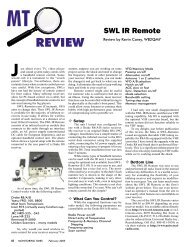RIGHT-click here - Monitoring Times
RIGHT-click here - Monitoring Times
RIGHT-click here - Monitoring Times
You also want an ePaper? Increase the reach of your titles
YUMPU automatically turns print PDFs into web optimized ePapers that Google loves.
The Arabs<br />
Zanzibar was one of the major East African<br />
trading points for Arabs and Africans by<br />
the 1400s. While under control of Sayyid ibn<br />
Sultan, the Sultan of Oman and Muscat in the<br />
first half of the 19th century, the sultan had clove<br />
plantations created on Zanzibar.<br />
The introduction of cloves to the island<br />
(from the Maluku Islands, Indonesia) was<br />
Zanzibar’s entrée into the spice trade. This<br />
project resulted in the island becoming a major<br />
commercial hub for the trading of goods from<br />
Europe, America, and Africa.<br />
The Sultan maintained control of the region<br />
through economic domination of most of<br />
the neighboring coastland and a heavy military<br />
occupation of Zanzibar. An effect of the Arab’s<br />
presence on Zanzibar was that the island became<br />
a source of Arabian cultural influence on the<br />
east-central African continent.<br />
The British<br />
Because of Britain’s colonial dominance<br />
in the Indian Ocean region in the 19th century,<br />
Zanzibar’s economic rise didn’t escape British<br />
notice. They had already operated in close cooperation<br />
with Sayyid’s government in Oman, so<br />
were aware of – and interested in – the sultan’s<br />
projects on Zanzibar and the island’s growing<br />
status in the world trading market.<br />
British influence on Zanzibar began in<br />
1841, when British administrators started to<br />
assist the Arab leaders with organizing and<br />
running the island. The British opposed the<br />
Arab use of African slaves on the plantations,<br />
as well as Zanzibar’s active slave trade under<br />
Sayyid’s rule: East and Central Africans were<br />
forcibly taken to Zanzibar from w<strong>here</strong> they<br />
would be exported for sale as slaves, primarily<br />
to southwest Asia.<br />
Plantation working conditions were so<br />
harsh that t<strong>here</strong> was a regular breakdown of the<br />
health of the slaves. The Sayyid administration’s<br />
response to this situation was to continually import<br />
more people from East and Central Africa<br />
to replace slaves who were ill or had died.<br />
The British continued to pressure Sayyid<br />
and his successors to stop using slave labor<br />
and trade in slaves, finally succeeding in their<br />
efforts in the 1870s. At times perhaps as much<br />
as 90% of Zanzibar’s populace was comprised<br />
of African slaves.<br />
The British oversaw the division of Zanzibar<br />
and Oman into separate sultanates in<br />
1860. As Britain and Germany gained imperial<br />
hegemony over East Africa in the 1880s, the<br />
sultanate of Zanzibar lost dominion over its<br />
territories on the mainland. In 1890, Zanzibar<br />
became a British protectorate. The British reorganized<br />
the government and constructed the<br />
Legislative Council, though its policies favored<br />
Zanzibar’s Arabs over its Africans.<br />
As the economies of the European colonies<br />
on the East African mainland grew, that of Zanzibar<br />
diminished. Though the British nurtured<br />
trade on the island, Zanzibar slowly devolved<br />
into a backwater of the British Empire.<br />
Post World War II, as many African<br />
colonies made advances toward independence,<br />
Zanzibar’s political system evolved. The first<br />
free elections for seats in the Legislative Council<br />
were held in 1961. Because of the domestic<br />
African-Arab hostilities, members of the African<br />
populace rioted after the elections.<br />
In the 1963 elections, the Arabs prevailed<br />
and won independence for Zanzibar. A violent<br />
African-supported coup in 1964 led to the<br />
evacuation of the last sultan and the bulk of<br />
the Arabian inhabitants. Zanzibar’s plantations<br />
were subdivided and dispersed to smaller-scale<br />
property owners, reorganizing the island’s agricultural<br />
systems.<br />
After uniting with Tanganyika to create<br />
the union called Tanzania, Zanzibar reserved<br />
its own government to administer island issues.<br />
The Port City of Zanzibar<br />
Zanzibar City is the capital of the Urban/<br />
West Region of the Zanzibar Archipelago. It was<br />
founded perhaps in the 8th century as a trading<br />
port for Indian Ocean commerce. Sayyid ibn<br />
Sultan moved his principal home from Muscat,<br />
Oman to Zanzibar City in 1840, when trading<br />
traffic from North America, the Indian Ocean<br />
region and Europe was on the increase. It became<br />
the main slave trading market of the East<br />
African coast.<br />
When under British colonial administration<br />
from 1890, Zanzibar City functioned as<br />
the capital for Zanzibar and Pemba. Because<br />
the island evolved into a major world trading<br />
hub, the port drew an international population<br />
of not only East Africans and Arabs, but South<br />
Asians as well.<br />
One of the shortest conflicts in military history<br />
occurred in 1896 with the Anglo-Zanzibar<br />
War: When the island’s Omanis rebelled, the<br />
Royal Navy began to fire on Stone Town, resulting<br />
in the sultan’s surrender 45 minutes later.<br />
Through the 1964 revolution, Zanzibar<br />
City continued as the seat of administration of<br />
the island and archipelago. The port exports<br />
cloves and clove oil, citrus fruits and coconuts.<br />
The port can serve large ships and the island’s<br />
road network extends from it.<br />
Programming<br />
Though the ZBC is a domestic broadcaster<br />
(“regional broadcaster” might be more accurate),<br />
you will surely hear news in their English<br />
segment you won’t find anyw<strong>here</strong> else, and their<br />
news coverage isn’t limited to domestic topics.<br />
Notes from my past loggings of Radio Tanzania<br />
(all done via a Degen DE1103 and an indoor,<br />
very random-wire antenna) reveal that, much<br />
like a major international broadcaster, ZBC’s<br />
news coverage was often of a global scope.<br />
From notes taken over several broadcasts, all on<br />
11735 kHz at 1800 UTC, I recorded a dizzying<br />
list of 27 countries, from Latvia to Venezuela,<br />
covered in Zanzibar’s English news program.<br />
Of the varied music you’ll hear on ZBC,<br />
some of it will be of a genre called taarab, an<br />
Arabic word meaning “feeling joy with music.”<br />
The influences in this musical melting pot are<br />
not only Middle Eastern, but European, North<br />
and Sub-Saharan African, and South Asian. Traditional<br />
taarab uses poetry – sometimes ancient<br />
texts – as lyrics.<br />
Taarab became especially popular in the<br />
The House of Wonders, Stone Town, Zanzibar,<br />
in the early 20th century, built by the Second<br />
Sultan of Zanzibar in 1883.<br />
late 1920s, and later began to absorb aspects of<br />
Lebanese and Egyptian art music and Indian<br />
movie soundtracks. Following the revolution,<br />
East African and Latin rhythms entered the<br />
genre. The instruments which make up a traditional<br />
taarab orchestra include European guitar,<br />
East African percussion, and various East Asian<br />
and Middle Eastern stringed instruments.<br />
In a general sense, when you tune into<br />
ZBC’s broadcasts, you’ll usually hear what<br />
sounds like traditional Middle Eastern instrumental<br />
or call-and-answer music, alternated<br />
with that which sounds like percussion-heavy<br />
East African music, and some which seems to be<br />
a blend of both. You can really feel the heritage<br />
of the island through the traditional music which<br />
ZBC plays.<br />
Tune in and Contact<br />
Though sign-on and sign-off times seem to<br />
vary, the invaluable resource www.eibi.de.vu/<br />
lists the following schedule for ZBC Radio:<br />
1500-2100 UTC 11735 kHz Swahili to East Africa<br />
1800-1810 English<br />
0300-0600 UTC 6015 kHz Swahili to East Africa<br />
The antennas for both frequencies are<br />
reportedly Chinese, and of recent vintage. The<br />
power of each shortwave transmitter is apparently<br />
50 kW. Now that they are recently back<br />
on air, the ZBC might be interested to hear how<br />
their signal is doing, even if you are outside<br />
their target zone. If you’d like to send a reception<br />
report or just let them know they are being<br />
heard in your area, you can reach them via:<br />
Sauti Ya Tanzania Zanzibar<br />
P.O. Box 1178<br />
Zanzibar, Tanzania<br />
karumehouse@tvz.co.tv<br />
Be prepared to include cash, gifts, postage,<br />
and a pre-prepared card if you want a QSL from<br />
Zanzibar. As the sometime destination of pirates<br />
such as George Booth and John Bowen, one of<br />
the famous Spice Islands with a rich history<br />
of influences from Arabian and Portuguese to<br />
East African and British, t<strong>here</strong> could hardly be<br />
a more exotic location than Zanzibar to listen<br />
to on your shortwave receiver.<br />
And, though it might refer to the ocean<br />
breezes carrying the sound coastward, when<br />
you tap the rich vein of music which the ZBC<br />
offers, you can consider the island’s proverb,<br />
“When you play the flute in Zanzibar, all Africa<br />
dances”<br />
August 2012 MONITORING TIMES 13
















